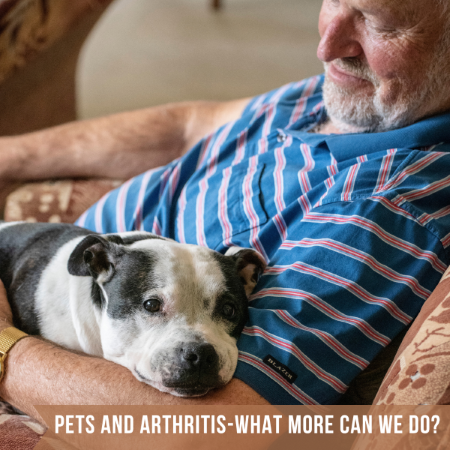
Mobility changes due to osteoarthritis are among the most common age-related concerns discussed during veterinary appointments. Because senior pets are more likely to be affected by arthritis, many pet parents think specific pain responses are age-related. Owners may believe it is normal for their animals to sleep more and become less active as they age, while it may actually be a response to arthritic pain. In fact, only 13% of cats are diagnosed and managed with arthritis, although ~90% of cats over the age of 12 are affected (Zoetis United States, 2024). Over 80% of dogs over the age of 8 are affected (Canine Arthritis Management, 2024).
The first step in managing osteoarthritis is educating owners to recognize signs of possible arthritis. You may notice your dog or cat…
- Using stairs more slowly or refusing to use them at all.
- Having a harder time jumping onto couches, countertops, or beds.
Maybe the signs of discomfort are more challenging to recognize, like…
- Licking joints
- Stiff movements
- Difficulty posturing to go to the bathroom
- Increased irritability in your pet
North Penn Animal Hospital prides itself on bringing our clients the latest and up-to-date options in managing osteoarthritis. The FDA (Food and Drug Administration) has recently approved new osteoarthritis medications in cats and dogs. Librela (dogs) and Solensia (cats) are monthly injectable treatments that block Nerve-Growth Factor, a protein essential for pain detection. What is the benefit? These injectable medications provide options to patients who are difficult to medicate at home, have underlying co-morbidities that prevent the use of NSAIDs or can’t tolerate other medication options.
Please call to schedule an appointment if you believe you may see signs related to osteoarthritis in your pet. North Penn Animal Hospital would happily evaluate your pet for osteoarthritis and discuss treatment options. We are here to help you and your pets live their best lives!
September 9, 2024
Alex Bailey, Outpatient Technician; Christine Seelaus, DVM
References
- Arthritis – the basics. Canine Arthritis Management. (2024). https://caninearthritis.co.uk/what-is-arthritis/arthritis-the-basics/#:~:text=Arthritis%20is%20commonly%20and%20mistakenly,of%20dogs%20of%20all%20ages.
- Understanding the New Science of Feline OA Pain. Zoetis. (2024). https://www.zoetisus.com/conditions/petcare/oa-pain/feline-oa-pain.
- Schmelz, M., Mantyh, P., Malfait, A., Farrar, J., Yaksh, T., Tive, L., Viktrup. (2019). Nerve growth factor antibody for the treatment of osteoarthritis pain and chronic low-back pain: mechanism of action in the context of efficacy and safety. Pain. 160 (10): 2210-2220.
- Enomoto, M., Mantyh, P., Murrell, J., Innes, J., Lascelles, B. (2018) Anti-nerve growth factor monoclonal antibodies for the control of pain in dogs and cats. Vet Rec. 184 (1): 23
- Barker, P., Mantyh, P., Arendt-Nielsen, L., Tive, L. (2020) Nerve growth factor signaling and its contribution to pain. Journal of Pain Research. 2020 (13): 1223-1241
- Corral, M., Moyaert, H., Fernandes, T., Escalada, M., Tena, J., Walters, R., Stegemann, M. (2021). A prospective, randomized, blinded, placebo-controlled multisite clinical study of bedinvetmab, a canine monoclonal antibody targeting nerve growth factor, in dogs with osteoarthritis. Veterinary Anesthesia and Analgesia. 8 (001)
- Zoetis (2023, May 5). Zoetis Announces U.S. FDA Approval of Librela (bedinvetmab injection) to Control Osteoarthritis (OA) Pain in Dogs. [Press Release]. https://news.zoetis.com/press-releases/press-release-details/2023/Zoetis-Announces-U.S.-FDA-Approval-of-Librela-bedinvetmab-injection-to-Control-Osteoarthritis-OA-Pain-in-Dogs/default.aspx.

